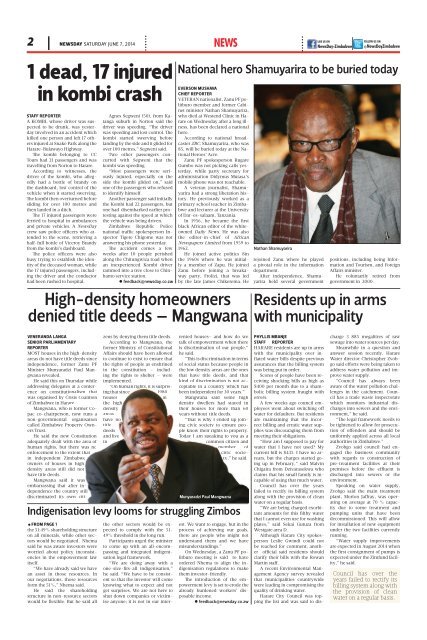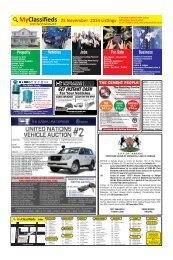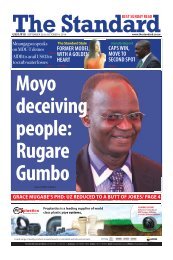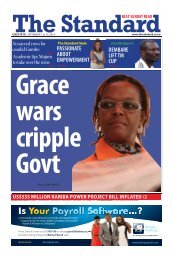Newsday 7 June 2014
You also want an ePaper? Increase the reach of your titles
YUMPU automatically turns print PDFs into web optimized ePapers that Google loves.
2<br />
NEWSDAY SATURDAY JUNE 7, <strong>2014</strong><br />
NEWS<br />
1 dead, 17 injured<br />
in kombi crash<br />
STAFF REPORTER<br />
A KOMBI, whose driver was suspected<br />
to be drunk, was yesterday<br />
involved in an accident which<br />
killed one person and left 17 others<br />
injured at Snake Park along the<br />
Harare-Bulawayo Highway.<br />
The kombi belonging to CC<br />
Tours had 21 passengers and was<br />
travelling from Norton to Harare.<br />
According to witnesses, the<br />
driver of the kombi, who allegedly<br />
had a bottle of brandy on<br />
the dashboard, lost control of the<br />
vehicle when it started swerving.<br />
The kombi then overturned before<br />
sliding for over 100 metres and<br />
then landed in a ditch.<br />
The 17 injured passengers were<br />
ferried to hospital in ambulances<br />
and private vehicles. A NewsDay<br />
crew saw police officers who attended<br />
to the scene, retrieving a<br />
half-full bottle of Viceroy Brandy<br />
from the kombi’s dashboard.<br />
The police officers were also<br />
busy trying to establish the identity<br />
of the deceased woman, while<br />
the 17 injured passengers, including<br />
the driver and the conductor<br />
had been rushed to hospital.<br />
Agnes Segweni (50), from Katanga<br />
suburb in Norton said the<br />
driver was speeding. “The driver<br />
was speeding and lost control. The<br />
kombi started swerving before<br />
landing by the side and it glided for<br />
over 100 metres,” Segweni said.<br />
Two other passengers concurred<br />
with Segweni that the<br />
kombi was speeding.<br />
“Most passengers were seriously<br />
injured, especially on the<br />
side the kombi glided on,” said<br />
one of the passengers who refused<br />
to identify himself.<br />
Another passenger said initially<br />
the Kombi had 22 passengers, but<br />
one had disembarked earlier protesting<br />
against the speed at which<br />
the vehicle was being driven.<br />
Zimbabwe Republic Police<br />
national traffic spokesperson Inspector<br />
Tigere Chigome was not<br />
answering his phone yesterday.<br />
The accident comes a few<br />
weeks after 10 people perished<br />
along the Chitungwiza road when<br />
an inexperienced Kombi driver<br />
rammed into a tree close to Chinhamo<br />
service station.<br />
• feedback@newsday.co.zw<br />
National hero Shamuyarira to be buried today<br />
EVERSON MUSHAVA<br />
CHIEF REPORTER<br />
VETERAN nationalist, Zanu PF politburo<br />
member and former Cabinet<br />
minister Nathan Shamuyarira,<br />
who died at Westend Clinic in Harare<br />
on Wednesday after a long illness,<br />
has been declared a national<br />
hero.<br />
According to national broadcaster<br />
ZBC, Shamuyarira, who was<br />
85, will be buried today at the National<br />
Heroes’ Acre.<br />
Zanu PF spokesperson Rugare<br />
Gumbo was not picking calls yesterday,<br />
while party secretary for<br />
administration Didymus Mutasa’s<br />
mobile phone was not reachable.<br />
A veteran journalist, Shamuyarira<br />
had a strong liberation history.<br />
He previously worked as a<br />
primary school teacher in Zimbabwe<br />
and lecturer at the University<br />
of Dar-es-salaam, Tanzania.<br />
In 1956, he became the first<br />
black African editor of the whiteowned<br />
Daily News. He was also<br />
the editor-in-chief of African<br />
Newspapers Limited from 1959 to<br />
1962.<br />
He joined active politics 8in<br />
the 1960s where he was initially<br />
a member of Zapu. He joined<br />
Zanu before joining a breakaway<br />
party, Frolizi, that was led<br />
by the late James Chikerema. He<br />
High-density homeowners<br />
denied title deeds — Mangwana<br />
Nathan Shamuyarira<br />
rejoined Zanu where he played<br />
a pivotal role in the information<br />
department.<br />
After independence, Shamuyarira<br />
held several government<br />
positions, including being Information<br />
and Tourism, and Foreign<br />
Affairs minister.<br />
He voluntarily retired from<br />
government in 2000.<br />
Residents up in arms<br />
with municipality<br />
• FROM PAGE 1<br />
the 51:49% shareholding structure<br />
on all minerals, while other sectors<br />
would be negotiated. Nhema<br />
said he was aware investors were<br />
worried about policy inconsistencies<br />
in the empowerment law<br />
itself.<br />
“We have already said we have<br />
an asset in those resources. In<br />
our negotiations, those resources<br />
form the 51%,” Nhema said.<br />
He said the shareholding<br />
structure in non-resource sectors<br />
would be flexible. But he said all<br />
VENERANDA LANGA<br />
SENIOR PARLIAMENTARY<br />
REPORTER<br />
MOST houses in the high-density<br />
areas do not have title deeds since<br />
independence, former Zanu PF<br />
Minister Munyaradzi Paul Mangwana<br />
revealed.<br />
He said this on Thursday while<br />
addressing delegates at a conference<br />
on constitutionalism that<br />
was organised by Crisis Coalition<br />
of Zimbabwe in Harare.<br />
Mangwana, who is former Copac<br />
co-chairperson, now runs a<br />
non-governmental<br />
organisation<br />
called Zimbabwe Property Own-<br />
ers Trust.<br />
He said the new Constitution<br />
adequately dealt with the area of<br />
human rights, but there was no<br />
enforcement to the extent that<br />
in independent Zimbabwe<br />
owners of houses in high<br />
density areas still did not<br />
have title deeds.<br />
Mangwana said it was<br />
embarrassing that after independence<br />
the country still<br />
discriminated its own citi-<br />
zens by denying them title deeds.<br />
According to Mangwana, the<br />
former Ministry of Constitutional<br />
Affairs should have been allowed<br />
to continue to exist to ensure that<br />
the rights of people as enshrined<br />
in the constitution — including<br />
the rights to shelter — were<br />
implemented.<br />
“On human rights, it is surprising<br />
that since 1980<br />
houses<br />
in<br />
the high<br />
density<br />
areas<br />
have no<br />
title<br />
deeds<br />
and live<br />
in<br />
rented houses– and how do we<br />
talk of empowerment when there<br />
is discrimination of our people,”<br />
he said.<br />
“This is discrimination in terms<br />
of social status because people in<br />
the low density areas are the ones<br />
that have title deeds, and that<br />
kind of discrimination is not acceptable<br />
in a country which has<br />
been independent for 30 years.”<br />
Mangwana said some high<br />
density dwellers had stayed in<br />
their houses for more than 60<br />
years without title deeds.<br />
“That is why I ended up joining<br />
civic society to ensure people<br />
know their rights to property.<br />
Today I am speaking to you as a<br />
common citizen and<br />
member<br />
of<br />
civic<br />
society,”<br />
he said.<br />
Munyaradzi Paul Mangwana<br />
Indigenisation levy looms for struggling Zimbos<br />
the other sectors would be expected<br />
to comply with the 51-<br />
49% threshold in the long run.<br />
Participants urged the minister<br />
to come up with an all-encompassing<br />
and integrated indigenisation<br />
legal framework.<br />
“We are doing away with a<br />
one-size-fits-all indigenisation,”<br />
he said. “We have to be consistent<br />
so that the investor will come<br />
knowing what to expect and not<br />
get surprises. We are not here to<br />
shut down companies or victimise<br />
anyone; it is not in our interest.<br />
We want to engage, but in the<br />
process of achieving our goals,<br />
there are people who might not<br />
understand them and we have<br />
misunderstandings.”<br />
On Wednesday, a Zanu PF politburo<br />
meeting is said to have<br />
ordered Nhema to align the indigenisation<br />
regulations to make<br />
them investor-friendly.<br />
The introduction of the empowerment<br />
levy is set to erode the<br />
already burdened workers’ disposable<br />
income.<br />
• feedback@newsday.co.zw<br />
PHYLLIS MBANJE<br />
STAFF REPORTER<br />
HARARE residents are up in arms<br />
with the municipality over inflated<br />
water bills despite previous<br />
assurances that the billing system<br />
was being put in order.<br />
Scores of people have been receiving<br />
shocking bills as high as<br />
$400 per month due to a shambolic<br />
billing system fraught with<br />
errors.<br />
A few weeks ago council employees<br />
went about switching off<br />
water for defaulters. But residents<br />
are maintaining that the incorrect<br />
billing and erratic water supplies<br />
was discouraging them from<br />
meeting their obligations.<br />
“How am I supposed to pay for<br />
water that I have not used? My<br />
current bill is $435. I have no arrears,<br />
but the charges started going<br />
up in February,” said Malvin<br />
Chigaira from Dzivarasekwa who<br />
claims that his small family is incapable<br />
of using that much water.<br />
Council has over the years<br />
failed to rectify its billing system<br />
along with the provision of clean<br />
water on a regular basis.<br />
“We are being charged exorbitant<br />
amounts for this filthy water<br />
that I cannot even use for washing<br />
plates,” said Sekai Gutuza from<br />
Westgate area D.<br />
Although Harare City spokesperson<br />
Leslie Gwindi could not<br />
be reached for comment, another<br />
official said residents should<br />
clarify their bills with the Rowan<br />
Martin staff.<br />
A recent Environmental Management<br />
Agency survey revealed<br />
that municipalities countrywide<br />
were leading in compromising the<br />
quality of drinking water.<br />
Harare City Council was topping<br />
the list and was said to discharge<br />
3 885 megalitres of raw<br />
sewage into water sources per day.<br />
Meanwhile in a question and<br />
answer session recently, Harare<br />
Water director Christopher Zvobgo<br />
said efforts were being taken to<br />
address water pollution and improve<br />
water supply.<br />
“Council has always been<br />
aware of the water pollution challenges<br />
in the catchment. Council<br />
has a trade waste inspectorate<br />
which monitors industrial discharges<br />
into sewers and the environment,”<br />
he said.<br />
“The legal framework needs to<br />
be tightened to allow for prosecution<br />
of offenders and should be<br />
uniformly applied across all local<br />
authorities in Zimbabwe.”<br />
Zvobgo said council had engaged<br />
the business community<br />
with regards to construction of<br />
pre-treatment facilities at their<br />
premises before the effluent is<br />
discharged into sewers or the<br />
environment.<br />
Speaking on water supply,<br />
Zvobgo said the main treatment<br />
plant, Morton Jaffray, was operating<br />
on average at 70 % capacity<br />
due to some treatment and<br />
pumping units that have been<br />
decommissioned. This will allow<br />
for installation of new equipment<br />
under the two facilities currently<br />
running.<br />
“Water supply improvements<br />
are expected in August <strong>2014</strong> when<br />
the first consignment of pumps is<br />
expected under the Zimfund facility,”<br />
he said.<br />
Council has over the<br />
years failed to rectify its<br />
billing system along with<br />
the provision of clean<br />
water on a regular basis.


















